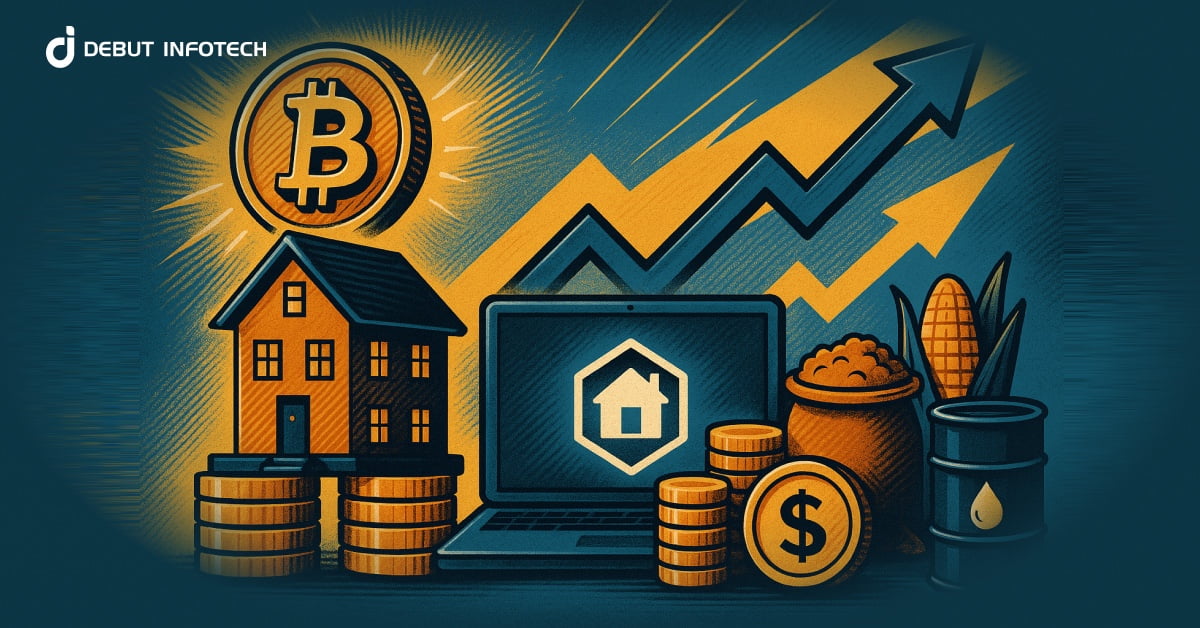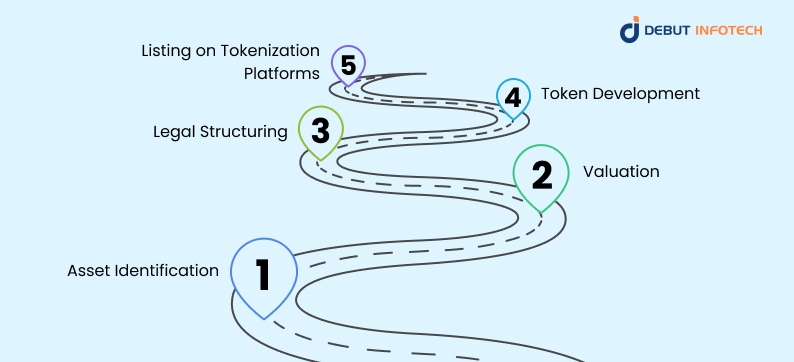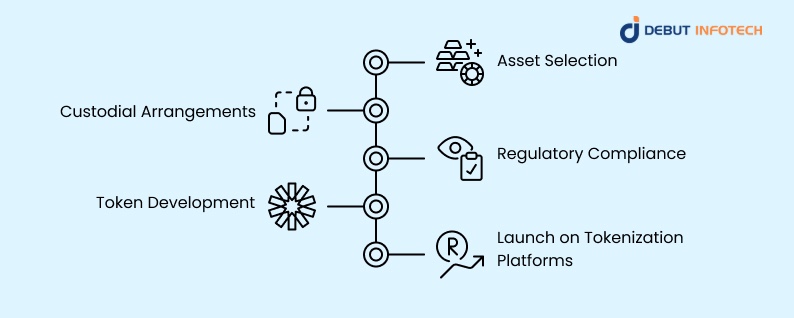Table of Contents
Home / Blog / Tokenization
Real Estate Tokenization and Commodities: The New Era of Investment in 2026
August 12, 2025

August 12, 2025
The rapidly advancing blockchain, tokenization, and decentralized finance fields would, in their own way, bring about a transformative phase in 2025. Perhaps one of the key changes is in the evolving practice of real estate tokenization, a procedure that enables highly valuable properties to be divided into digital tokens representing fractional ownership. This innovation broke down barriers to entry, allowing investors anywhere in the world to get into lucrative real estate ventures without purchasing entire properties.
Tokenized commodities, from metals like gold to carbon credits, are coming up fast alongside real estate, fighting for transparency, liquidity, and shelter for investors in traditionally illiquid areas. Thus, while tokenized real estate and commodities, in tandem, have been heralding a new era in real-world asset tokenization, they are also huge enablers in taking investments previously available to an exclusive few and listing them on tokenization platforms and licensed tokenization firms for big market exposure.
You can Unlock the Future of Investment
Partner with Debut Infotech to launch your real estate or commodity tokenization project today and tap into a trillion-dollar opportunity.
What is Tokenization in the Context of Real Estate and Commodities?
In its most basic terms, tokenization refers to assigning ownership rights over some real or intangible assets to digital tokens and the safe storage of these tokens on a blockchain. These tokens serve as cryptographic evidence of ownership, secure from theft, alteration, or destruction. They can be exchanged or traded between parties or stored as part of an investment portfolio.
In real estate, tokenization allows an investor to buy a fraction of a property, be it residential, commercial, or mixed-use condo, without holding the full asset. Similarly, in commodities, tokenization allows an investor to hold digital tokens representing gold, oil, carbon credits, or other valuable resources without handling the physical products.
This process eliminates most entry barriers into investments, converting traditional illiquid assets into divisible, accessible, and globally tradeable instrument units.

How It Works
- Asset Identification: Choose a physical or intangible asset, such as an apartment complex, a logistics warehouse, gold reserves, or verified carbon credits.
- Valuation: Conduct a professional appraisal or market analysis to establish the asset’s current market worth.
- Legal Structuring: Draft the legal framework to define ownership rights, fractional shares, and investor protections.
- Token Development: Create blockchain-based tokens that digitally represent proportional ownership of the asset.
- Listing on Tokenization Platforms: List tokens on regulated marketplaces where they can be bought, sold, or traded.
Why It Matters
Tokenization bridges traditional finance and blockchain innovation, creating a hybrid model that preserves asset-backed security while unlocking new possibilities for liquidity and global participation.
- Divisibility: Break large, expensive assets into affordable investment units.
- Liquidity: Enable faster, simpler transactions via blockchain-based trading.
- Transparency: Provide immutable ownership records backed by blockchain technology.
The Rise of Real Estate Tokenization
Real estate tokenization is rapidly transforming the global property investment landscape. By leveraging blockchain technology, real estate tokenization platforms allow physical property ownership to be digitized into tradable digital tokens. Each token represents a fraction of the property’s value, enabling investors to purchase only the amount they wish to own, instead of acquiring an entire asset.
This innovation is reinventing how real estate is bought, sold, and maintained. Unlike traditional real estate businesses that tend to be slow, expensive, and geographically limited, tokenization presents instant, secure, and borderless investment opportunities. Blockchain maintains an immutable ledger, keeping every transaction involving tokens transparent, verifiable, and impossible to forge; the novel question of trust between investor and owner was created.
Key Benefits of Real Estate Tokenization
- Fractional Ownership: Investors can own some high-value properties without committing to a full purchase, making premium assets more accessible.
- Global Accessibility: Geographic barriers are removed, allowing investors from any part of the world to participate in real estate markets that were once inaccessible.
- Increased Liquidity: Tokens can be traded on secondary markets, giving investors a quicker exit strategy than traditional property sales.
- Lower Entry Barriers: With reduced capital requirements, more individuals can participate in real estate investments once reserved for institutional investors.
Example: Imagine a luxury commercial tower valued at $10 million. The property could be divided into 1 million tokens worth $10 through real estate commodity tokenization. An investor with $500 could purchase 50 tokens, while another with $50,000 could buy 5,000 tokens, benefiting from rental yields and potential asset appreciation.
This flexibility democratizes real estate investing and enables investors to diversify across multiple properties and markets, reducing overall risk while maximizing potential returns.
Real Estate Commodity Tokenization Explained
Real estate commodity tokenization is an innovative investment approach that combines the value of property ownership with the income potential of physical commodities. By linking real estate projects to tokenized assets such as gold, oil, or carbon credits, investors can enjoy multiple streams of returns—capital appreciation from the property and profits from the associated commodities.
For example, a commercial complex under construction could be tied to gold tokenization, allowing token holders to benefit from rental income once the property is operational and the fluctuating and often appreciating value of gold reserves. Similarly, a green-certified office building could be linked to carbon credit tokenization, giving investors an edge in the growing sustainability market.
This dual-asset model diversifies investment risk, boosts liquidity, and attracts a broader range of global investors looking for asset security and flexible portfolio options.
Related Read: Legal Considerations in Asset Tokenization
Use Cases
- Luxury Resorts with Gold Tokenization: High-end resorts backed by precious metal reserves, where each token grants fractional ownership of the property and a stake in gold holdings.
- Sustainable Buildings Linked to Carbon Credit Tokenization: Eco-friendly real estate developments where investors earn returns from property appreciation while trading verified carbon credits on blockchain markets.
Tokenized Commodities in 2025
Tokenizing commodities means creating blockchain-based digital tokens representing partial or full ownership of a tangible resource. These commodities can range from traditional assets like gold, silver, and oil to modern, sustainability-focused assets such as carbon credits and renewable energy certificates.
In 2025, this practice will no longer be experimental—it will become a mainstream investment strategy, driven by growing demand for fractional ownership, transparent transactions, and global market access. As blockchain infrastructure matures and regulatory clarity improves, more institutional and retail investors are adding tokenized commodities to their portfolios to diversify and hedge against market volatility.
Why Tokenize Commodities?
- Liquidity: Tokenization transforms historically slow-moving commodity markets into agile, real-time trading environments. For example, gold tokenization allows ownership to change hands instantly without needing physical delivery.
- Transparency: Every transaction is recorded on the blockchain, providing immutable, verifiable proof of ownership and significantly reducing the risk of fraud or double-spending.
- Accessibility: Fractional ownership lowers the barrier to entry, enabling individuals to invest in high-value commodities like oil reserves or rare metals with only a small amount of capital.
- Global Reach: Digital tokens can be traded 24/7 across borders, allowing commodities to reach a broader investor base than traditional commodity exchanges.
- Integration with DeFi: Tokenized commodities can serve as collateral in decentralized lending platforms, creating new income streams for holders.
Related Read: What is tokenization
How to Tokenize Commodities
Tokenizing commodities transforms physical assets—like gold, oil, agricultural goods, or carbon credits—into blockchain-based digital tokens that can be bought, sold, and traded globally. The process requires asset management expertise, blockchain technology, and regulatory adherence to ensure trust and market adoption.

Below is the step-by-step breakdown of how to tokenize commodities effectively:
1. Asset Selection
Choose a commodity that has stable demand and a well-established market value. Popular examples include gold tokenization for precious metals, carbon credit tokenization for environmental assets, and agricultural goods like wheat or coffee for trade markets. The asset must be tangible, measurable, and easy to verify.
2. Custodial Arrangements
Once the commodity is selected, secure physical storage arrangements are made. For example, gold may be stored in insured vaults, while agricultural commodities may be stored in certified warehouses. These custodians play a critical role in maintaining investor trust, as the physical asset backs the digital token.
3. Regulatory Compliance
Every jurisdiction has its regulations for commodities trading and tokenization. Ensuring compliance with securities laws, anti-money laundering (AML) guidelines, and Know Your Customer (KYC) procedures is essential to avoid legal complications and to gain credibility with investors.
4. Token Development
Here, blockchain engineers and tokenization companies create digital tokens representing ownership of the commodity. This step involves secure smart contract development on leading tokenization platforms, defining how the tokens will be issued, transferred, and redeemed.
5. Launch on Tokenization Platforms
Finally, the tokens are listed on compliant marketplaces or private exchanges where investors can buy, sell, and trade them. These platforms ensure liquidity and open access to a global pool of investors who want exposure to commodities without dealing with physical delivery or storage.
The Role of Tokenization Platforms and Companies
Tokenization platforms form the backbone of the digital asset ecosystem, enabling the creation, issuance, and trading of tokenized assets across global markets. They provide the technology infrastructure, security protocols, and regulatory compliance frameworks to ensure smooth and transparent transactions.
A robust platform doesn’t just host the asset—it verifies ownership, integrates payment tokenization for secure settlements, and often connects to secondary markets for improved liquidity. In many cases, these platforms also incorporate data tokenization methods to safeguard sensitive information related to investors and asset ownership.
Beyond the platforms, tokenization companies are critical in bridging the gap between the physical asset and the digital market. They guide asset owners through legal compliance, token development, and market launch, ensuring every step meets industry standards.
Types of Tokenization Companies
- Real Estate Tokenization Company: Specializes in converting physical property assets—commercial buildings, residential complexes, or land—into blockchain-based tradeable tokens. These tokens can then be bought and sold via real estate tokenization platforms.
- Commodity Tokenization Firm: Focuses on tokenizing tangible goods like gold, oil, agricultural products, and carbon credit tokenization assets, making them easier to trade without the complexities of physical delivery.
- Hybrid Tokenization Service Providers: Handle multiple asset classes under one roof, including fund tokenization, equity tokenization, and even real world asset tokenization, offering flexibility for diverse investment portfolios.
Related Read: Tokenization Across Multiple Industries
Tokenization Platforms vs. Tokenization Companies
| Aspect | Tokenization Platforms | Tokenization Companies |
| Primary Role | Provide infrastructure for creating, listing, and trading tokens | Manage the end-to-end process of converting assets into digital tokens |
| Key Functions | Secure storage, trading interface, compliance tools, investor dashboards | Legal setup, asset valuation, token development, marketing strategy |
| Users | Investors, traders, asset owners | Asset owners, developers, institutional clients |
| Examples of Assets Supported | Real estate, commodities, equity, funds | Real estate, commodities, carbon credits, mixed asset portfolios |
| Revenue Model | Transaction fees, listing fees, subscription services | Project-based fees, consultation charges, percentage of raised capital |
| Regulatory Involvement | Enforces compliance for listed assets | Ensures the asset meets legal and market standards before launch |
Real World Asset Tokenization Trends in 2025
By 2025, real-world asset tokenization is set to evolve into a multi-trillion-dollar market, reshaping how assets are traded, owned, and managed. The shift is driven by technological advancements and broader market adoption.
Key Growth Drivers
- Institutional Adoption: Major investment funds and asset managers increasingly diversify into blockchain-based assets for higher efficiency and returns.
- Regulatory Clarity: Governments and financial authorities are introducing clearer tokenization frameworks, making it safer for retail and institutional investors.
- Integration with DeFi: Tokenized assets are becoming popular collateral in decentralized finance (DeFi) platforms, enabling borrowing, lending, and yield farming.
Specialized Forms of Tokenization
Tokenization is expanding well beyond real estate commodity tokenization and gold tokenization into new asset classes that combine security, liquidity, and innovation.
Examples include:
- Data Tokenization: Converts sensitive data into secure cryptographic tokens while enabling analytics and compliance.
- Payment Tokenization: Protects payment data by replacing it with secure, non-sensitive tokens during transactions.
- Carbon Credit Tokenization: Facilitates trading verified emission credits, supporting sustainability and ESG goals.
- Fund Tokenization: Transforms investment fund shares into blockchain tokens for faster, more transparent distribution.
- Equity Tokenization: Allows fractional ownership of companies without going through traditional public stock exchanges.
Related read: Real Estate Tokenization Cost Guide
Investment Advantages of Tokenized Assets
Tokenized assets provide unique benefits that traditional investments cannot match.
- Liquidity in Illiquid Markets: You can sell property shares or gold tokens almost instantly, making once illiquid assets easy to trade.
- Lower Transaction Costs: Fewer intermediaries mean lower fees for buying and selling.
- Global Participation: Anyone from anywhere can invest without geographical limits.
- Enhanced Transparency: Blockchain records ensure clear and tamper-proof ownership histories.
Challenges and Considerations
While tokenization is promising, it comes with its own set of challenges.
- Regulatory Uncertainty: Laws vary by country, which can make compliance complex.
- Custody Risks: Physical assets, like gold or property deeds, must be stored securely.
- Market Volatility: Prices of tokens can fluctuate with both commodity and cryptocurrency markets.
Future of Real Estate and Commodity Tokenization
By combining real estate tokenization with tokenized commodities, investors can build diverse, blockchain-backed portfolios exposed to property markets and tangible resources.
Predictions for the next five years:
- Mainstream Adoption: More retail investors will embrace fractional asset ownership.
- Integration with AI and IoT: For real-time asset tracking and valuation.
- Growth of Hybrid Assets: Combining real estate, commodities, and equity tokenization in one investment product.
Ready to Turn Assets into Digital Wealth?
Our experts in real estate tokenization and tokenized commodities will help you create secure, compliant, and profitable tokenization solutions—start your journey now.
Conclusion
The convergence of real estate tokenization and tokenized commodities represents a monumental shift in how assets are owned, traded, and invested in 2025. By leveraging real estate tokenization platforms and tokenization companies, investors gain unprecedented access to diversified, global portfolios once reserved for elite institutions.
This is more than a trend—it’s a structural evolution in financial markets. As real world asset tokenization continues to mature, opportunities for gold tokenization, carbon credit tokenization, and fund tokenization will multiply, giving both seasoned and new investors a secure, transparent, and liquid pathway into some of the world’s most lucrative markets.
Frequently Asked Questions
Q. What is real estate tokenization?
A. Real estate tokenization is the process of converting property ownership into digital tokens on a blockchain. This enables fractional ownership and easier trading of real estate assets.
Q. What are tokenized commodities?
A. Tokenized commodities are blockchain-based representations of physical resources like gold, oil, agricultural goods, or carbon credits, allowing them to be traded digitally with enhanced liquidity and transparency.
Q. How can I tokenize commodities?
A. To tokenize commodities, you must select the asset, secure physical storage, ensure legal compliance, develop blockchain tokens, and list them on regulated tokenization platforms.
Q. What are the benefits of real estate commodity tokenization?
A. Real estate commodity tokenization combines property investment with commodity value, offering diversified income streams, improved liquidity, and global accessibility.
Q. Are tokenized assets regulated?
A. Regulation varies by jurisdiction, but most reputable tokenization companies follow local financial laws, AML (Anti-Money Laundering) rules, and KYC (Know Your Customer) standards.
Q. What is the role of a real estate tokenization company?
A. A real estate tokenization company manages the digitization of property ownership, ensuring legal compliance, technical development, and integration with tokenization platforms.
Q. Is tokenization only for high-value assets?
A. While it is common for high-value assets like commercial properties and gold to be tokenized, smaller-scale assets, funds, and even data can also be tokenized for broader market participation.
Talk With Our Expert
Our Latest Insights
USA
Debut Infotech Global Services LLC
2102 Linden LN, Palatine, IL 60067
+1-708-515-4004
info@debutinfotech.com
UK
Debut Infotech Pvt Ltd
7 Pound Close, Yarnton, Oxfordshire, OX51QG
+44-770-304-0079
info@debutinfotech.com
Canada
Debut Infotech Pvt Ltd
326 Parkvale Drive, Kitchener, ON N2R1Y7
+1-708-515-4004
info@debutinfotech.com
INDIA
Debut Infotech Pvt Ltd
Sector 101-A, Plot No: I-42, IT City Rd, JLPL Industrial Area, Mohali, PB 140306
9888402396
info@debutinfotech.com



Leave a Comment